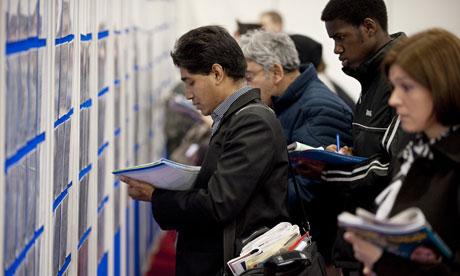Unemployment rises unexpectedly
Today's data – fuelled by a drop in public-sector employment – will fan fears that Britain could suffer a 'jobless recovery'
• Get the Claimant figures
- guardian.co.uk,
- Article history

UK unemployment has risen back over the 2.5 million mark, fanning fears that Britain is suffering a "jobless recovery".
The number of people out of work in Britain rose by 35,000 in the three months to October, pushing the unemployment total up to 2,502,000. This raised the UK's unemployment rate to 7.9% (from 7.8% in the previous quarter), the highest rate in six months.
City economists had expected a drop of 15,000 in the number of people out of work, which would have lowered the unemployment rate to 7.7%.
The rise was mainly due to a drop in public-sector employment, where 33,000 jobs were lost over the period. Regionally, the north-east saw the biggest fall in public-sector jobs, followed by the south-west and east of England.
Chris Grayling, the employment minister, said the figures showed the importance of keeping the UK economy growing.
"It's essential to create a stable environment where businesses can flourish and create jobs – with those on benefits at the front of the queue to take them up," Grayling said.
The government has predicted 330,000 jobs will be lost in the public sector over the next four years, but insists that this will be compensated by a rise in private-sector jobs. Today's data, though, showed that private-sector employment has flat-lined, raising concerns for ministers.
David Birne, an insolvency practitioner at HW Fisher chartered accountants, warned that many companies were facing a "bleak" time, making it impossible for them to increase their workforce.
"Anyone who thinks the private sector can take up the slack from the public sector is out of touch with what's happening on the ground," Birne said.
During prime minister's questions today, David Cameron said he was "concerned" by the rise in joblessness, but pledged that the government's Work Programme would help people recover from the "tragedy" of unemployment.
"We must do everything we can to help people into a job," he said.
But Brendan Barber, the TUC general secretary, warned that Cameron's economic policies risked "growth-choking mass unemployment".
"Today's figures suggest public-sector unemployment will be far higher than the government predicts, while the private-sector jobs that are supposed to compensate for these losses are failing to materialise. Public servants are fearful about their futures when the cuts really start to hit home," Barber said.
Unemployment to rise in 2011
James Knightley, economist at ING, said the UK labour report was "fairly disappointing coming after a recent run of very good figures". Last month, the unemployment total dropped by 9,000 in the three months to September, to 2.45 million. But Knightley was also encouraged that the number of job vacancies rose by 11,000.
The Office for National Statistics (ONS) also reported a small fall in the number of people claiming unemployment benefits. The claimant count dropped by 1,200 in November, to 1.4627 million, compared with analysts' forecasts of a decline of 3,000.
With economic growth expected to slow in the UK next year, analysts believe that ongoing public-sector job cuts and weak job creation in the private sector will lead to more unemployment in 2011.
Charles Davis, managing economist at the Centre for Economics and Business Research, said: "The labour market recovery seen earlier in 2010 has lost some momentum, in line with an easing in the pace of economic growth.
"In many cases, businesses are still too cautious about future prospects to aggressively expand headcount, especially ahead of a year in which the VAT rise and the effect of soaring commodity prices will squeeze households," Davis added.
The ONS also reported that average earnings including bonuses rose by 2.2% over the year to October, up from 2.1% in September but below the inflation rate.
Howard Archer, chief UK and European economist at IHS Global Insight, said: "With real wage growth negative and the major fiscal squeeze increasingly kicking in from the start of 2011, it is hard to see consumer spending being anything else than limited for an extended period.
The pound fell by more than half a cent against the dollar today, to $1.5667 by midday.
Details emerged yesterday of a government document that suggested the number of young people who are long-term unemployed is likely to double next year. A prospectus issued by the Department for Work and Pensions predicted that between 140,000 and 200,000 young people aged from 18 to 24 will be registered as having been unemployed for at least nine months or more between 2011-12.
There are also concerns that the US could suffer a "jobless recovery", as its unemployment rate remains close to 10%.

No comments:
Post a Comment